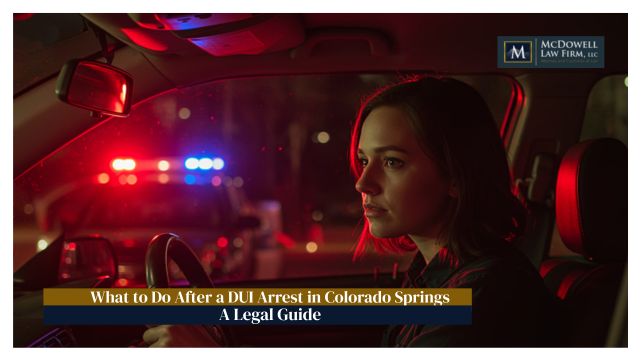Getting pulled over after a few drinks may feel like a minor issue. But in Colorado, even a slight impairment can result in a DWAI charge—Driving While Ability Impaired. While it’s a lesser charge than DUI, a DWAI conviction still carries serious penalties that can impact your finances, driving record, and future.
At McDowell Law Firm, we want you to understand your rights, the legal definitions, and the best steps to take if you’ve been charged with DWAI in Colorado Springs. Here’s what you need to know.
What Is DWAI in Colorado?
DWAI stands for Driving While Ability Impaired. Under Colorado law, it is illegal to operate a motor vehicle if alcohol or drugs impair your ability—even slightly. Unlike a DUI (Driving Under the Influence), which typically requires a Blood Alcohol Content (BAC) of 0.08% or higher, you can be charged with DWAI if your BAC is between 0.05% and 0.079%.
Even if your BAC is under 0.05%, law enforcement may still charge you with DWAI based on observable signs of impairment. Colorado officers rely on field sobriety tests, breathalyzer results, and behavioral observations to establish probable cause.
DWAI vs. DUI: Key Differences
BAC Limits and Legal Thresholds
- DWAI: BAC between 0.05% and 0.079% or other signs of slight impairment.
- DUI: BAC of 0.08% or higher or clear signs of significant impairment.
DWAI vs DUI: Penalties
First-Time DWAI Penalties (Misdemeanor):
- 2 to 180 days in jail (all jail time can be suspended)
- $200 to $500 in fines
- 24 to 48 hours of community service
- Up to 2 years probation
- 8 points on your Colorado DMV record
First-Time DUI Penalties:
- Up to 1 year in jail
- Up to $1,000 in fines
- 48 to 96 hours of community service
- License suspension for up to 9 months
- 12 DMV points on your driving record
Repeat offenses for both DWAI and DUI result in increasingly severe penalties, including mandatory jail time, license revocation, and possible felony charges after three or more convictions. As you can see, a DUI’s possible penalties are double in many categories. The points assessed are 8 for a DWAI, and 12 for a DUI. This is important because 12 is the magic number in Colorado to revoke your driver’s license. A DWAI conviction, by itself, will not take your license unless you are under 21. However, if you already have 4 or more points on your license, it will cause a point suspension.
Remember, you can still face a loss of license through the DMV administrative hearing if your BAC was in excess of a .08, but you plead to a DWAI.
Here’s how this could work:
Tammy was charged with a DUI with a BAC of a .096. In court, she was offered and accepted the reduced charge of a DWAI. Although the conviction for a DWAI won’t affect her license, the DMV filed a per se administrative revocation on her license for her BAC in excess of a .08. At this hearing, if the DMV upholds the action, she can still face a revocation.
Now, let’s assume Tammy’s BAC was lower than .08 (and she’s over 21), the DMV wouldn’t file a revocation action. If she then pleaded to a DWAI, it would not revoke her license.
Marijuana and DWAI in Colorado
Since recreational marijuana is legal in Colorado, many drivers assume they’re safe to drive after consuming cannabis. However, the legal THC limit is 5 nanograms per milliliter of blood. Law enforcement officers assess impairment based on field sobriety tests, blood test results, and observable behavior.
It’s important to know that medical marijuana users are not exempt. Even if you have a valid medical card, you can still be charged with DWAI or DUI.
How Law Enforcement Determines Impairment
Police officers in Colorado Springs evaluate several factors:
- Driving behavior (swerving, delayed braking)
- Field sobriety test results (HGN, walk and turn, one leg stand, counting, etc.)
- Breathalyzer or blood test results
- Physical signs (glassy eyes, slurred speech)
- Inconsistent responses to questions
Even if your BAC is below 0.08%, you can still face charges if officers determine your ability to operate a vehicle safely was impaired.
Proving a DWAI Charge
DWAI cases are often built on both subjective and objective evidence. Prosecutors will use:
- Officer testimony
- Field sobriety test performance
- Chemical test results
- Witness statements
- Body camera footage
Unlike DUI cases, which often rely heavily on BAC levels, DWAI charges can rest on the officer’s observation of “slight” impairment—making it a more subjective charge.
Common Defenses Against DWAI Charges
An experienced DWAI attorney can help you build a strong defense. Common defense strategies include:
- Illegal Traffic Stop: Challenging the legality of the initial stop.
- Inaccurate Field Sobriety Test: Arguing that poor performance was due to nerves, fatigue, or medical conditions.
- Faulty Breathalyzer or Blood Test: Questioning the calibration and accuracy of the testing equipment.
- Alternative Explanations: Demonstrating other reasons for slurred speech or erratic driving.
- Lack of Probable Cause: Arguing that there was no reasonable basis for a DWAI arrest.
Penalties for DWAI: Penalty Chart And What to Expect
In Colorado Springs, DWAI punishments increase with each DUI or DWAI conviction. We have summarized the standard sentences in the chart below:
| Penalties | First DWAI | Second DWAI | Third DWAI | Fourth DWAI |
| Crime Class | Misdemeanor | Misdemeanor | Misdemeanor | Class 4 Felony |
| Incarceration | 2 to 180 days | 10 days to 1 year | 60 days to 1 year | 2 to 6 years (+ 3 years parole) |
| Fines | $200 to $500 | $600 to $1,500 | $600 to $1,500 | $2,000 to $500,000 |
| Community Service | 24 to 48 hours | 48 to 120 hours | 48 to 120 hours | n/a |
| Probation | Up to 2 years | 2 years | 2 to 4 years (incl. 90 days alcohol monitoring) | Depends (incl. 90 days alcohol monitoring) |
| Suspended Sentence | n/a | 1 year | 1 year | Depends |
| DMV Points | 8 points | 8 points | 8 points | 8 points |
| License Revocation | None | 1 year | 2 years | 2 years |
After receiving DWAI charges in Colorado, you will experience a series of things. It may feel overwhelming, which is why you need to know them beforehand. Below, we have elaborated on what to expect when charged with a DWAI in Colorado:
- Jail Time Increases with Each Offense
A 1st DWAI may mean just a few days in jail or none. A 2nd or 3rd offense comes with mandatory time behind bars. A 4th conviction turns into a felony, leading to years in prison. The more times you get caught, the harsher the punishment gets. - Fines Can Hit Hard
The first DWAI fine is manageable, but repeat offenses get expensive. By the 4th offense, fines can reach half a million dollars. Court costs, attorney fees, and lost wages add up fast. Financial strain is one of the biggest burdens of a DWAI conviction. It’s common especially for the repeat offenders. - Losing Your License Gets Worse Every Time
A 1st DWAI won’t take away your license, but a 2nd one will. A 3rd conviction means losing it for 2years. By the 4th offense, the penalties become severe, and getting your license back isn’t guaranteed. Every DWAI puts your driving privileges at serious risk. - Probation and Alcohol Monitoring Are Likely
Probation can last up to 4 years if you have multiple DWAI offenses. Courts often require alcohol monitoring, meaning regular tests and check-ins. Missing a test or violating probation can send you to jail. Even after serving your sentence, restrictions can continue affecting your daily life.
Why You Need a DWAI Lawyer in Colorado Springs
DWAI charges are serious. Even a first offense can impact your job, insurance rates, and freedom. A skilled DWAI defense lawyer can:
- Identify flaws in the prosecution’s case
- Challenge improper testing procedures
- Negotiate for reduced charges or dismissal
- Represent you at DMV hearings to protect your license
At McDowell Law Firm, we know how to navigate Colorado’s impaired driving laws. Our legal team works tirelessly to defend your rights and secure the best possible outcome for your case.
Contact McDowell Law Firm Today
If you’ve been charged with DWAI in Colorado Springs, don’t wait. The sooner you involve a defense attorney, the better your chances of avoiding harsh penalties. Contact McDowell Law Firm for a free consultation today.
We’ll review your case, explain your options, and help you fight the charge with confidence. Protect your future—we’re here to help.




